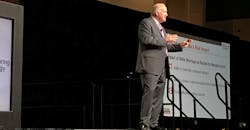Lincoln Electric CEO: The Skills Gap Is Not a Short-Term Problem
Lincoln Electric has been around forever (since 1895), has name recognition with not only welders but anyone who’s ever been within spitting distance of a welding machine, and hasn’t had a layoff since (gulp) the late 1940s. It's a solid place to work. Yet Lincoln, like other manufacturers large and small, still struggles every day with finding the skilled workers it needs to staff its 63 facilities, 40% of which are in the United States.
Chris Mapes, Lincoln Electric’s CEO, told the crowd at his keynote address Wednesday at the IndustryWeek Manufacturing & Technology Conference that manufacturers need to look at the skills gap as “a long-term strategic challenge,” just as it regards productivity.
“We really don’t need to debate whether [the skills gap] exists or not and whether we think we’ll have a shortage of 2 million workers or 500,000 workers or a million workers,” said Mapes. “I think it’s a useless approach. At the end of the day, we should acknowledge that it exists and that we’re having a shortage. It’s not going away—we’re going to have it for years and years to come.”
The shortage is particularly dire in welding, where the average age of a U.S. welder is 56, and 30,000 welders retire each year. Lincoln, which has the unique problem of both having to develop workers for its plants and develop a customer base—trained welders to use its equipment--is tackling the shortage from three directions:
The first is education: scaling up programs and access. Lincoln, which has the longest continually running welding school in the U.S. (established 1917), continues to update existing training centers and build new ones, including a new welding technology and training center on its main campus in Cleveland. “We get around 7,000 visitors a year in Cleveland to talk about welding and technology,” said Mapes.
But training facilities are only part of the equation. “We’ve developed an entire education model,” said Mapes. “We want to make it easier for the welding educator. Not just teaching them the welding, but giving them the curriculum,” and putting it online and being accessible. Also, it's important to be able to answer their questions when they have teaching challenges, and make technology that measures mechanical aptitude and dexterity available for companies to use as a first-pass test to see if recruits are capable of being qualified welders.
The second piece is automation. With unemployment at record lows, it’s time to pinpoint the jobs that nobody wants, and--instead of passing them off to new recruits who will become discouraged and leave—automate them, said Mapes.
“Quite frankly, we just put in some automation in one of our manufacturing facilities because we were expecting an employee to be able to take a 40 to 50 pound reel off a piece of equipment and roll it 10 to 12 feet away,” he said. “And our people have been doing it for decades. But at the end of the day, that’s too difficult. There’s an easier way for us to approach that job.”
Then an employer can redeploy their labor and hiring resources into an area of the plant where they’re also strggling with hiring, but the jobs are more appealing for entry-level people.
The third area is collaboration. Mapes recently visited the Lincoln plant in Fort Laramie, Ohio, and the plant manager apologized for having 400 kids coming in to tour the plant. Far from being upset, Mapes was three. “We recognize the importance of exposing kids to manufacturing. We all own that responsibility.” At the Cleveland facility, Lincoln brings in 25 high school students every week in a work-study program to learn technical skills. The company is also heavily involved with the American Welding Society, providing a trailer that travels around and gives people their first exposure to welding.
About the Author

Laura Putre
Senior Editor, IndustryWeek
As senior editor, Laura Putre works with IndustryWeek's editorial contributors and reports on leadership and the automotive industry as they relate to manufacturing. She joined IndustryWeek in 2015 as a staff writer covering workforce issues.
Prior to IndustryWeek, Laura reported on the healthcare industry and covered local news. She was the editor of the Chicago Journal and a staff writer for Cleveland Scene. Her national bylines include The Guardian, Slate, Pacific-Standard and The Root.
Laura was a National Press Foundation fellow in 2022.
Got a story idea? Reach out to Laura at [email protected]
